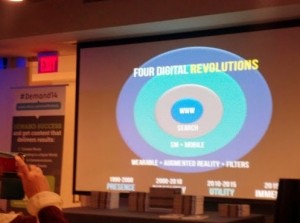The next stage of the digital revolution is coming, and Mark Schaefer thinks he knows what it will be.
At a terrific talk on “content shock” at Google’s DC headquarters, Schaefer discussed the past, present, and future of the digital revolution—and what this means for your business.
Content shock is real.
It’s harder and harder for any business to stand out. Schaefer noted, as an example, that the average Facebook user can find 1,500 possible posts. And less and less of all this digital content (not just on Facebook) is coming from brands as consumers increasingly become content creators.
This means your business is competing online with cat videos and selfies—and coming soon, Schaefer jokingly suggested, cat selfies.
There’s too much stuff out there.
And we’re filtering content in (and out) more and more.
This brings me to the four stages of the digital revolution.

The first digital revolution was the Internet. Not the Internet per se, of course, but what it enabled.
The second digital revolution was search. The ability to catalog information made content more broadly findable. Optimized search made it easier for businesses to stand out, and smart companies figured out how to drive traffic to their sites.
The third digital revolution is social media and mobile. We’re in this stage now. Social and mobile have changed not just how we consume information but where. It’s not just about having a content strategy. It’s not just about democratized access. It’s also about the very nature of influence.
And it’s no longer about finding the mover and shaker in the crowd. Instead, you have to understand who has the ability to move your content across their network. To amplify your content, and to give it street cred.
You need to have both a content strategy and a network strategy.
The fourth digital revolution, Schaefer posits, will be wearable + augmented reality + filters.
We’re not there yet.
Today’s wearable tech isn’t terribly innovative.
Companies are struggling with digital ubiquity.
The next digital revolution requires that technology be seamlessly integrated into our lives. It’s about experiences that don’t require first opening an app to scan a barcode or repeating the same query 10 times into your Google Glasses.
Schaefer suggested that “we need to create content that is so immersive and interactive that we tear people away from filters to spend time with us.”
And he asked: “What happens to marketing when there are no boundaries?”
I don’t have all the answers. No one does. But it’s clear that the businesses that win the content game today and into the future are those that figure out how to adapt and thrive in an era of content overload.
How does your business stand out?
Feature photo courtesy of Jon Bailey.



